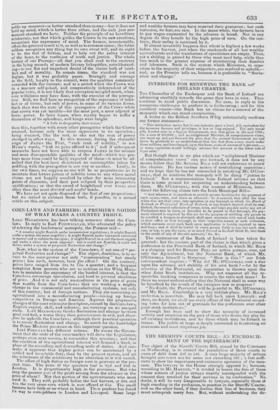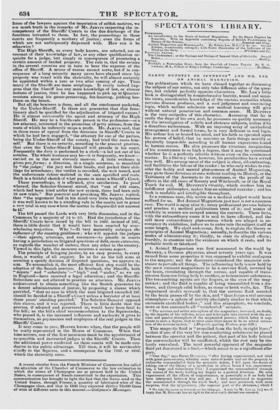THE SHERIFFS' COURTS BILL : AN ENCROACH- MENT OF THE
SQUIREARCHY.
THE object of the Sheriffs' Courts Bill, passed by the Commons on Wednesday, is to extend the jurisdiction of those courts in cases of debt from 201. to 50/. A very large majority of actions brought into court are for sums not exceeding 501.; a fact suffi- cient to show the importance and extensive operation of the mea- sure. The lawyers in the House strongly opposed it ; because, according to Mr. HARVEY, " it tended to lessen the fees of those whose notions of justice always exactly corresponded with the amount they received for their services in its vindication." No doubt, it will be very disagreeable to lawyers, especially those of high standing in the profession, to practise in the Sherif& Courts; and on the other hand, if they decline that line of business, they must relinquish many fees. But, without undertaking the de-
fence of the lawyers against the imputation of selfish motives, we see much truth in the remarks of Mr. JERVIS respecting the in- competency of the Sheriffs' Courts to the due discharge of the functions intrusted to them. In fact, the proceedings in these courts are frequently a mockery of justice ; even the forms of which are not unfrequently dispensed with. How can it be otherwise?
The High Sheriffs, as every body knows, are selected, not on account of their knowledge of law, or any other qualification re- quisite for a judge, but simply in consequence of possessing a certain amount of landed property. The rule is, that the estates in the several counties are in turn to bear the expense of the office of Sheriff. A minor of course cannot serve, but if in con- sequence of a long minority many years have elapsed since his property was taxed with the shrievalty, he will almost certainly be appointed within a year or two after coming of age. Thus ,many of the Sheriffs are mere striplings. It rarely indeed hap- pens that the Sheriff has any more knowledge of law, or clearer notions of justice, than he has happened to pick up at Quarter- sessions among his game-preserving, fox-hunting, jobbing bre- thren on the bench.
But all the business is done, and all the emolument pocketed, by the Under-Sheriff. Is there any guarantee that this func- tionary shall be qualified for the adjudication of litigated causes? He is almost universally the agent and attorney of the High Sheriff. He may be a fourth-rate person in the profession—or a low attorney, interested in the promotion of petty actions, from the costs of which he indirectly reaps a profit. Mr. JERVIS said, that in three cases of appeal from the decisions in Sheriffs' Courts in which he had been engaged, "the attorney for one of the parties, being the Under-Sheriff of the county, had tried the cases him- self." But there is no security, according to the present practice, that even the Under-Sheriff himself will preside in his court. Frequently the duty is performed by a clerk—a lad not out of his articles. The whole business may be—it is frequently, we know— carried on in the most slovenly manner. A little evidence is given pro forma; a direction, in a single sentence, is mumbled by "the judge;" the jury nod their heads, and pocket their shil- lings for attendance; the verdict is recorded, the writ issued, and the unfortunate debtor mulcted in the sum specified and costs. Such is a faithful sketch of what passes in many a Sheriff's Court.
These proceedings, it is affirmed, give satisfaction. In proof whereof, the Solicitor-General stated, that "out of 948 cases, which bad been tried under the new system, there had been only 36 new trials." But practical and provoking Mr. JERVIS replied, that "the argument had in his mind very little weight, because it was well known to be a standing rule in the courts not to grant a new trial in any case where the matter in dispute did not amount to 51."
The bill passed the Lords with very little discussion, and in the Commons by a majority of 54 to 23. Had the jurisdiction of the Sheriffs Courts been raised by the bill to 5001. instead of 50/., there is little doubt that it would have been enacted by over- whelming majorities. Why ?—It very materially enlarges the influence of Me country gentlemen ; who will appoint t he judges —their agents, attornies, and creatures—to preside in courts having a jurisdiction on litigated questions of debt, more extensive, as regards the number of suitors, than any other in the country. Viewed in this light, the measure assumes a serious aspect.
The principle of bringing justice, by an easy process, to every door, is worthy of all support. In so far as the bill aims at securing a speedy decision of disputed questions, we approve its aim. To accomplish it, the most efficient first step would be the adoption of the Scotch practice. In Scotland, the Sheriffs, both "depute " and " substitute "—" high" and " under," as we say
in England—have received a legal education ; and the Sheriffs- Substitute are not allowed to practice as attornies. Mr. JERVIS
endeavoured to obtain something like the Scotch guarantee for a decent administration of justice, by proposing a clause which provided, " that no case in which the sum litigated exceeded 201.
should be decided in a Sheriff's Court unless a barrister of at least three years' standing presided." The Solicitor-General opposed this clause, and it was rejected. There is little doubt that the proviso, if adopted and persevered in, would have been fatal to the bill ; as the bill's chief recommendation to the Squirearchy, who passed it, is the increased influence and authority it gives to themselves, as pay masters and employers of the real judges in the Sheriffs' Courts.
It may come to pass, Heaven knows when, that the people will be really represented in the House of Commons. When that time arrives, one of the first measures must he the appointment of responsible and instructed judges in the Sheriffs Courts. Then the additional power conferred on these courts will be made con- ducive to the public advantage. Till then, it will be serviceable clnefly to the Squires, and a recompense for the 7001. or 8001. which the shrievalty costs.



























 Previous page
Previous page